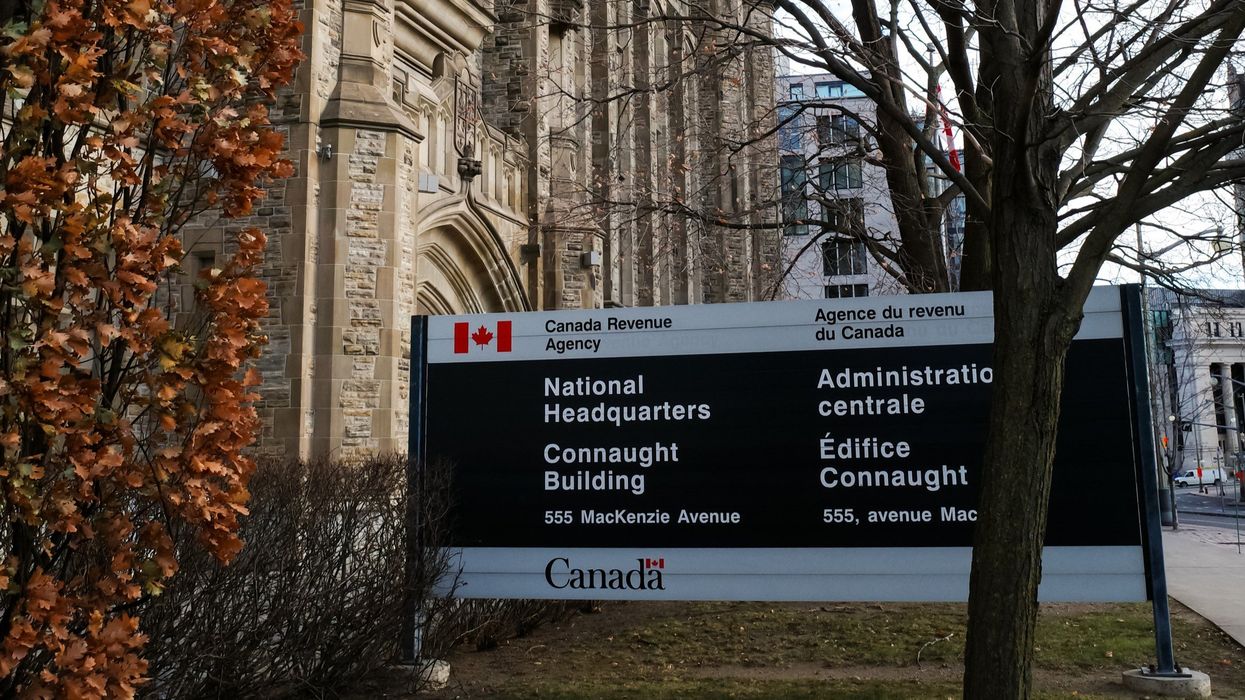Canada Revenue Agency Revealed Changes To Tax Returns You Need To Know About This Year
It's officially tax season in Canada!

Canada Revenue Agency sign at the national headquarters in Ottawa.
A few changes have been made to Canada's taxes that you should know about when filing your return this year.
So, the Canada Revenue Agency — also known as the CRA — recently revealed all of the updates which include new tax credits, changes to the T1 notice of assessment, a different way to claim home office expenses and more.
Tax season in Canada started on February 19, 2024, and you have until April 30, 2024 to file your taxes and pay any money you owe.
Here's everything the CRA wants you to know when filing your taxes this year about what's new for the 2023 income tax return.
T1 notice of assessment
The T1 notice of assessment and notice of reassessment has been changed to provide more complete information that's easier to understand.
Because of changes in the production of the cheque notice, you'll get a paper T1 notice of assessment and cheque separately if you're expecting a refund and not signed up for direct deposit.
Income tax package
Starting in 2024, the CRA will no longer print line-by-line instructions in the paper income tax package.
That means each paper package will be reduced by approximately 30 pages.
Payments over $10,000
As of January 1, 2024, remittances or payments to the Receiver General of Canada should be made as an electronic payment if the amount is over $10,000.
You could face a penalty unless you can't reasonably remit or pay the amount you owe electronically.
Disability tax credit
There is a new fully digital application process for the disability tax credit so applicants can complete Part A of the application form online in CRA My Account or over the phone.
Also, the applicant's portion of the form will be pre-populated with information already on file at the CRA.
Once the online form is completed, the applicant will receive a reference number to give to their medical practitioner who will use it to complete Part B of the form.
Advanced Canada Workers Benefit
Advanced payments of the Canada Workers Benefit are now automatically issued under the new Advanced Canada Workers Benefit.
You don't need to apply or fill out a tax form if you received the benefit in the previous tax year.
So, Form RC201, Canada Workers Benefit Advance Payment Application was discontinued last year.
Home office expenses for employees
The temporary flat rate method to claim a deduction for home office expenses can't be used for 2023 taxes.
If you want to claim home office expenses for 2023, you need to use the detailed method and get a completed Form T2200, Declaration of Conditions of Employment signed by your employer.
Deduction for tools
Starting in 2023, the maximum employment deduction for tradespersons' eligible tools has been bumped up from $500 to $1,000.
The threshold for expenses that are eligible through the apprentice mechanics tools deduction has changed as well.
Federal, provincial and territorial COVID-19 benefit repayments
Federal, provincial and territorial COVID-19 benefit repayments you made in 2023 can be claimed as a deduction on line 23200 of your 2023 Income Tax and Benefit Return.
First Home Savings Account
Starting on April 1, 2023, contributions to a First Home Savings Account are generally deductible and qualifying withdrawals are tax-free.
If you opened an FHSA in 2023, you can claim up to $8,000 in contributions you made by December 31, 2023, as an FHSA deduction on your 2023 return.
Your notice of assessment can also include a table for the FHSA balances that's similar to the RRSP table.
Multigenerational home renovation tax credit
The multigenerational home renovation tax credit is a new refundable tax credit that allows eligible individuals to claim certain renovation costs to create a secondary unit within a dwelling for a qualifying individual to live in.
You could claim up to $50,000 in qualifying expenses for each qualifying renovation, up to a maximum credit of $7,500 for each claim you make.
Residential Property Flipping Rule
As of January 1, 2023, changes to the Residential Property Flipping Rule mean any gain from the sale of a housing unit located in Canada (or a right to acquire a housing unit located in Canada) that you owned or held for less than 365 consecutive days before its sale is business income instead of capital gain.
Return of fuel charge proceeds to farmers tax credit
The return of fuel charge proceeds to farmers tax credit is now available to self-employed farmers and individuals who are members of a partnership operating a farming business with one or more permanent establishments in Alberta, Manitoba, New Brunswick, Newfoundland and Labrador, Nova Scotia, Ontario, P.E.I., or Saskatchewan.
This article's cover image was used for illustrative purposes only.
- Canada Taxes: Here's What You Need To Know About Filing Your 2023 Tax Return This Year ›
- 9 Canadian Tax Credits You Could Claim When Filing This Year That You Might Not Know About ›
- Claiming Home Office Expenses On Your Taxes Has Been Changed & Here's What You Need To Know ›
- These Are The Most Common Tax Mistakes You Can Make On Your Return, According To An Expert - Narcity ›
- You Can Get Money From The New Canada Carbon Rebate Soon But You Need To Do This - Narcity ›
- Canada Revenue Agency Offers This Service So You Can Get Your Taxes Done For Free ›
- Here's Where You Can Get Your Taxes Done For Free In Ontario With The CRA's Tax Service - Narcity ›